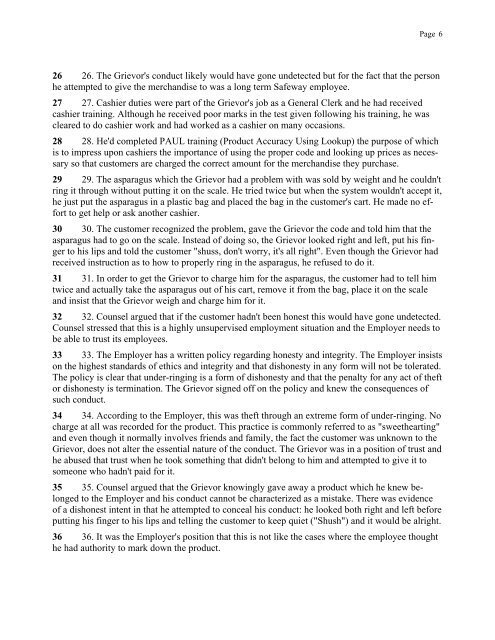FAQ's Cases - Stewart McKelvey
FAQ's Cases - Stewart McKelvey
FAQ's Cases - Stewart McKelvey
- No tags were found...
Create successful ePaper yourself
Turn your PDF publications into a flip-book with our unique Google optimized e-Paper software.
Page 626 26. The Grievor's conduct likely would have gone undetected but for the fact that the personhe attempted to give the merchandise to was a long term Safeway employee.27 27. Cashier duties were part of the Grievor's job as a General Clerk and he had receivedcashier training. Although he received poor marks in the test given following his training, he wascleared to do cashier work and had worked as a cashier on many occasions.28 28. He'd completed PAUL training (Product Accuracy Using Lookup) the purpose of whichis to impress upon cashiers the importance of using the proper code and looking up prices as necessaryso that customers are charged the correct amount for the merchandise they purchase.29 29. The asparagus which the Grievor had a problem with was sold by weight and he couldn'tring it through without putting it on the scale. He tried twice but when the system wouldn't accept it,he just put the asparagus in a plastic bag and placed the bag in the customer's cart. He made no effortto get help or ask another cashier.30 30. The customer recognized the problem, gave the Grievor the code and told him that theasparagus had to go on the scale. Instead of doing so, the Grievor looked right and left, put his fingerto his lips and told the customer "shuss, don't worry, it's all right". Even though the Grievor hadreceived instruction as to how to properly ring in the asparagus, he refused to do it.31 31. In order to get the Grievor to charge him for the asparagus, the customer had to tell himtwice and actually take the asparagus out of his cart, remove it from the bag, place it on the scaleand insist that the Grievor weigh and charge him for it.32 32. Counsel argued that if the customer hadn't been honest this would have gone undetected.Counsel stressed that this is a highly unsupervised employment situation and the Employer needs tobe able to trust its employees.33 33. The Employer has a written policy regarding honesty and integrity. The Employer insistson the highest standards of ethics and integrity and that dishonesty in any form will not be tolerated.The policy is clear that under-ringing is a form of dishonesty and that the penalty for any act of theftor dishonesty is termination. The Grievor signed off on the policy and knew the consequences ofsuch conduct.34 34. According to the Employer, this was theft through an extreme form of under-ringing. Nocharge at all was recorded for the product. This practice is commonly referred to as "sweethearting"and even though it normally involves friends and family, the fact the customer was unknown to theGrievor, does not alter the essential nature of the conduct. The Grievor was in a position of trust andhe abused that trust when he took something that didn't belong to him and attempted to give it tosomeone who hadn't paid for it.35 35. Counsel argued that the Grievor knowingly gave away a product which he knew belongedto the Employer and his conduct cannot be characterized as a mistake. There was evidenceof a dishonest intent in that he attempted to conceal his conduct: he looked both right and left beforeputting his finger to his lips and telling the customer to keep quiet ("Shush") and it would be alright.36 36. It was the Employer's position that this is not like the cases where the employee thoughthe had authority to mark down the product.
















